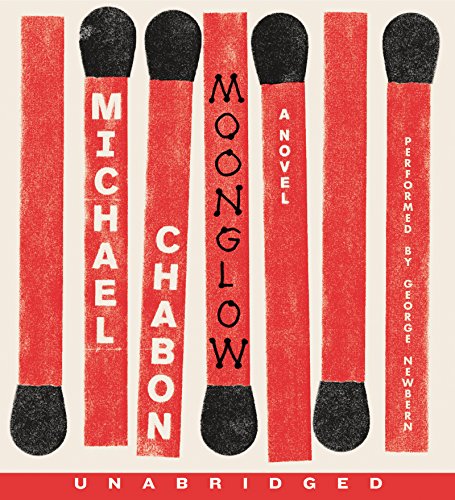
Following on the heels of his New York Times–bestselling novel Telegraph Avenue, Pulitzer Prize–winning author Michael Chabon delivers another literary masterpiece: a novel of truth and lies, family legends, and existential adventure—and the forces that work to destroy us.
In 1989, fresh from the publication of his first novel, The Mysteries of Pittsburgh, Michael Chabon traveled to his mother’s home in Oakland, California, to visit his terminally ill grandfather. Tongue loosened by powerful painkillers, memory stirred by the imminence of death, Chabon’s grandfather shared recollections and told stories the younger man had never heard before, uncovering bits and pieces of a history long buried and forgotten. That dreamlike week of revelations forms the basis of the novel Moonglow, the latest feat of legerdemain in the ongoing magic act that is the art of Michael Chabon.
Moonglow unfolds as the deathbed confession, made to his grandson, of a man the narrator refers to only as “my grandfather.” It is a tale of madness, of war and adventure, of sex and desire and ordinary love, of existential doubt and model rocketry, of the shining aspirations and demonic underpinnings of American technological accomplishment at mid-century and, above all, of the destructive impact—and the creative power—of the keeping of secrets and the telling of lies. A gripping, poignant, tragicomic, scrupulously researched and wholly imaginary transcript of a life that spanned the dark heart of the twentieth century, Moonglow is also a tour de force of speculative history in which Chabon attempts to reconstruct the mysterious origins and fate of Chabon Scientific, Co., an authentic mail-order novelty company whose ads for scale models of human skeletons, combustion engines and space rockets were once a fixture in the back pages of Esquire, Popular Mechanics and Boy’s Life. Along the way Chabon devises and reveals, in bits and pieces whose hallucinatory intensity is matched only by their comic vigor and the radiant moonglow of his prose, a secret history of his own imagination.
From the Jewish slums of prewar South Philadelphia to the invasion of Germany, from a Florida retirement village to the penal utopia of New York’s Wallkill Prison, from the heyday of the space program to the twilight of “the American Century,” Moonglow collapses an era into a single life and a lifetime into a single week. A lie that tells the truth, a work of fictional non-fiction, an autobiography wrapped in a novel disguised as a memoir, Moonglow is Chabon at his most daring, his most moving, his most Chabonesque.
An Amazon Best Book of November 2016: In the days following the publication of Mysteries of Pittsburgh, Michael Chabon traveled to California to sit by his dying grandfather, a typically taciturn and reserved man. But Dilaudid had loosened his tongue, and out came a torrent of remarkable stories of full of secrets, love, pain, sex, and regret. Chabon’s remarkable new “autobiographical novel” Moonglow is mined from, but not limited by, those conversations; as he states in his author’s note at the head of the book: “In preparing this memoir, I have stuck to facts except when facts refused to conform with memory, narrating purpose, or the truth as I prefer to understand it. Wherever liberties have been taken … the reader is assured that they have been taken with due abandon.” The result is a sprawling, yet intensely personal, paean to his grandparents, their lives together and as individuals. World War II and its atrocities cast long shadows, as does the Space Race and the titular moon, which hangs over the story as a bright dream of escape and a dark reminder of failed aspiration. Like The Mysteries of Pittsburgh, Wonder Boys, and especially The Amazing Adventures of Kavalier and Clay, this is classic Chabon: an intensely personal story uplifted by the shifting tectonic plates of truth and memory, floating atop his inimitably crafted, sometimes audacious, always original prose. –Jon Foro, The Amazon Book Review

”I have stuck to facts except when facts refused to conform with memory, narrative purpose, or the truth…” Moonglow, by Michael Chabon, tells a fictionalized history of his immediate family centered on being with his grandfather during the last two weeks before he succumbed to a painful cancer. His grandfather was a man not given to personal revelation, but under the influence of powerful painkillers and his imminent demise, he reveals the story of his life with Michael’s grandmother and mother. None of these key figures in Michael’s life are ever named, nor is his father. The…
Darkness visible Reflected light, filtered light, refracted light, radiant darkness, darkness visible, lunar eclipse, new moon, dark of the moon. Sunlight–“how exposure to light and air was destroying what centuries of darkness had preserved.” Throughout Michael Chabon’s novel, Moonglow, he evokes images of light and darkness, of the “glow” of a “blob” in space that might or might not be a cosmic dust cloud, of the affinity of darkness and silence and night as constants, contrasted…
Excellent literary fiction/memoir I “read” Michael Chabon’s some years back (actually listened to an unabridged recording on tape while I was commuting regularly) and really enjoyed it. But that was the only one of his books I’d read until Moonglow landed in my lap.